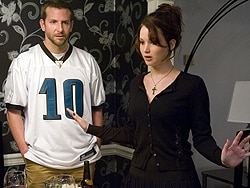The movie Silver Linings Playbook has been garnering critical acclaim and numerous award nominations, including today's announcement of 4 nods from the Golden Globes. But how accurately does it portray mental illness, a major theme in the film?
Bradley Cooper and Jennifer Lawrence in Silver Linings Playbook. Source: Snap Stills/Rex/Rex USA
|
At least one psychiatrist says that although he enjoyed the film, he found that it was not an accurate depiction of mental illness.
"It was a really nice love story with a Frank Capra ending that was reminiscent of It's a Wonderful Life," Michael Blumenfield, MD, president of the American Academy of Psychoanalysis and Dynamic Psychiatry, told Medscape Medical News.
"And it deals with topics not usually seen in a mainstream move," added Dr. Blumenfield, who is also a psychiatrist in Woodland Hills, California, and professor of psychiatry and behavioral sciences at New York Medical College, in Valhalla.
However, he noted that it should be viewed as entertainment only.
Love Doesn't Conquer All
In the movie, actor Bradley Cooper plays a man with bipolar disorder who is being released from a psychiatric hospital. He soon connects emotionally with a quirky young woman, played by Jennifer Lawrence, who has struggled with her own mental health issues, largely brought on by her husband's death.
In addition, Robert De Niro, who plays Cooper's father, is shown with symptoms of obsessive-compulsive disorder/strong superstitions and pathologic gambling. Yet all of this is marketed as a feel-good romantic comedy — complete with dancing.
It has hit big with both critics and the public. In addition to Golden Globe nominations for best picture, best screenplay, and best actor and actress for Cooper and Lawrence, the actors (including De Niro) were nominated earlier this week for awards from the Screen Actors Guild. The film also received the People's Choice Award at the Toronto International Film Festival.
However, not all reviews and online postings about the movie have been positive, especially with respect to the ending. The film ends on a very happy note, with a big kiss between the 2 main characters.
Some critics have expressed concern that the movie suggests that, in the end, all you need is love (without medication) to heal mental illness.
Richard Brody writes in the New Yorker that "the story challenges the medical 'establishment' and the efficacy of medical science in bringing about results. His mental health depends (and guess where this is going in the story) on his ability to control his behavior through force of will."
"The movie will be a hit with those who think that hyperactivity is just a failure of discipline and depression merely a bad attitude," he adds.
However, this interpretation hinges on the belief that toward the end of the movie, Cooper's character is lying when he says that he is taking his medication, because in scenes at the beginning of the film, he is shown only pretending to take his medication.
In an interview with Vulture, author and psychiatrist Steven Schlozman, MD, from the Department of Psychiatry at Harvard Medical School, Boston, Massachusetts, noted that he believed what the character said.
"This might very much have to do with what I do for a living, but I just assumed he went back on them," said Dr. Schlozman. "It never occurred to me that he might have stopped."
He added that "falling in love is an absolutely awesome, wonderful thing, but it's not going to cure bipolar disorder any more than it's going to cure diabetes. The flip side of that is...that people with psychiatric illnesses — horrible depression, bipolar disorder, even schizophrenia — they do better when they're in love."
No Laughing Matter
There has also been a lot of talk in the press about Cooper's character and whether his depiction of bipolar disorder is accurate.
Interestingly, the director (David O. Russell) has said in interviews that his son has the disorder. The movie is based on a book by Matthew Quick, who has reported that he has suffered with depression.
"You're never laughing at somebody that has a mental health illness, you're laughing at the absurdity of what's going on, for all the characters involved," said Quick in an interview with the Hollywood Reporter.
"As someone who has worked in the mental health community, I know that laughter is very important," added Quick.
Dr. Blumenfield said that he was worried and a little uncomfortable when he first started watching the movie.
Dr. Michael Blumenfield
|
"I'm always sensitive when people are laughing at people with mental illness, and that's what it seemed to be doing, not only to the main character but also to some of the other characters. But that soon changed, and I liked the movie very much," he said.
Dr. Blumenfield also dismissed concerns raised by a few critics that showing mostly manic episodes and not depressive ones is an unrealistic depiction of bipolar disorder.
"Some people have bipolar and don't have depression at all. The film wasn't necessarily saying, 'This is exactly what bipolar is like.' I think the movie showed the complexities of disorders and also showed how traumatic events can affect people."
In fact, he noted that he is not entirely convinced that Pat, the character played by Cooper, had bipolar disorder. The movie shows in flashbacks that Pat "snapped" and severely beat a man after catching him in the shower with Pat's wife. Because of this, it may be that Cooper's character is actually suffering from trauma, said Dr. Blumenfield.
"He wasn't the typical bipolar patient. He was a complex character that has been traumatized by an experience in his life. And it shows how he was able to eventually move on and find a new relationship. That's really what the movie was about," he explained.
However, when asked if this is a movie that clinicians should recommend to patients with mental illness and their families, Dr. Blumenfield said "no."
"It's a movie. And you have to enjoy it as just that. If I were to recommend this to my patients, I would be telling them, 'This is you. See how it worked out?' And I don't think I could do that. To recommend it is to say that this is a typical person with bipolar," he said.
"Somebody with bipolar may identify with it, and that's okay. And if someone in therapy has already seen this movie and has particular reactions to it, I think it's great to talk with them about it."
Dr. Blumenfield first wrote about this movie for his online blog Psychiatry Talk .


Comments
Post a Comment